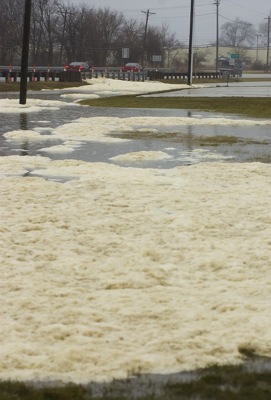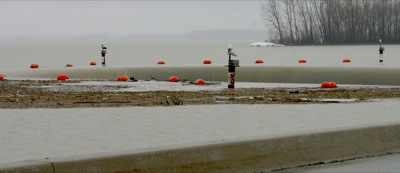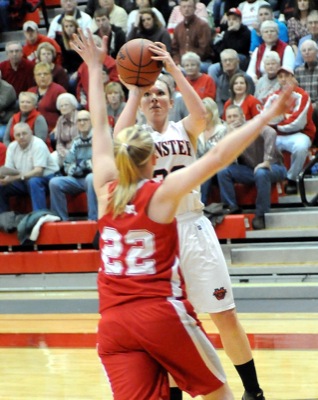Monday, March 7th, 2011
Alum test sites selected
Large-scale application to take place in May; state also plans to remove unwanted fish
By Nancy Allen
GRAND LAKE - Three sites have been chosen on Grand Lake for a second round of alum tests in preparation for a large-scale treatment in mid-May.
The alum is being used as a short-term solution to reduce toxic blue-green algae blooms that almost shut down the entire 13,500-acre lake last summer. Alum robs algae of phosphorus, its main food source.
The test sites are 8.11 acres at the west beach near the state park office that will receive granular alum; 7.6 acres at the state park campground lagoon that will be pretreated with peroxide and then receive liquid alum; and 5.3 acres at the Windy Point east channel that will receive a higher dose of liquid alum. The test areas will be treated between April 5 and 12, said Grand Lake St. Marys State Park Interim Manager Brian Miller.
Miller said the test sites will be monitored for 30 days after treatment. Curtains isolating the sites will start going up in the lake in a few weeks.
"The sites will be closed for public boat traffic during this time," Miller said. "We'll pull down the curtains the middle of May after the monitoring period is over.
The state-funded pilot tests are estimated to cost about $95,000. Bids are due in Columbus in a few weeks, Miller said.
The Ohio Department of Natural Resources is applying for $5 million from the Ohio EPA's Water Pollution Control Loan Fund to do the large-scale treatment in targeted areas of the lake, which have not been selected. That application will take 45 days. ODNR intends to apply for the loan with a request for principal forgiveness, which if approved, means the loan would not need to be paid back.
It's estimated that a whole-lake treatment would cost $8 to $10 million.
A public meeting will be held at 6 p.m. March 21 at Wright State University-Lake Campus' Dicke Hall to present cost estimates and answer questions about alum treatment. The meeting is a required step in applying for the Ohio EPA loan.
During a Lake Improvement Association (LIA) meeting in Celina on Saturday, Miller said the state is trying to entice commercial fishing in the lake to rid it of rough fish, such as gizzard shad, carp and sheephead. In the meantime, state employees will start removing fish this spring.
"We want to stress this is rough fish removal, not just carp, because we have more gizzard shad per acre in the lake than carp," Miller said. "We'll take a boat out and set six trap nets, remove the rough fish and put the game fish back in the lake and take the rough fish to shore to put in appropriate containers."
Studies show an overabundance of rough fish increases algae growth because the fish rile up the sediment and excrete phosphorous in their waste. Rough fish predominate in poor water quality conditions. Removing the fish is another short-term recommendation to help improve lake water quality.
Miller said his staff is limited and asked for volunteers to help remove fish. They can contact Miller at the state park office at 419-394-3611.
Under other business, LIA members learned:
• The LIA is looking for volunteers to gather dissolved oxygen data in lake channels and landings where fish spawn.
• The LIA's annual special kids fishing derby for developmentally and physically handicapped youths and adults is Sept. 14 at the East Bank shelter house No. 1. If the lake is under a water quality advisory due to algae toxins, the event will be held at Westview Park pond.
• LIA website organizers are running a five-part educational series on the lake's history, issues, economic impact and proposed water quality solutions. LIA President Tim Lovett said the LIA is aiming for a broader audience by using the website because toxic algae blooms are a worldwide issue.
• The annual conservation camp for youths 9-12 years old is July 8 at Harbor Point 4-H Camp. Contact Laura Walker, coordinator of the Grand Lake/Wabash Watershed Alliance, at 419-586-3289 for more information.
• Lawn soil sampling coupons to test levels of phosphorous and nitrogen are available at the Mercer County SWCD office in Celina and Helena in Coldwater. The coupons save people $15.



